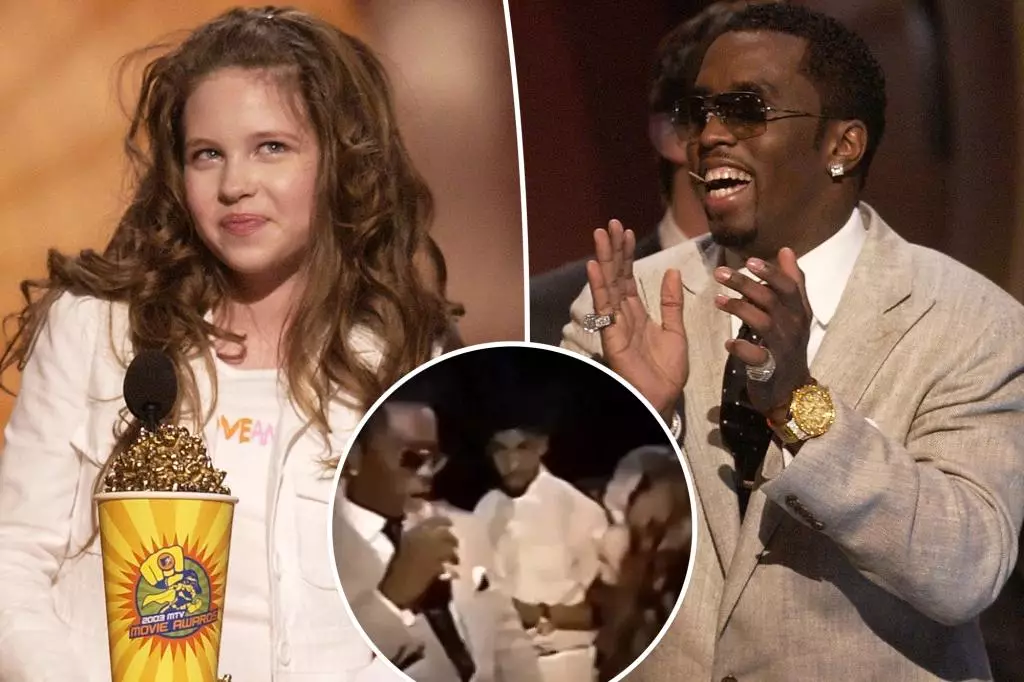The juxtaposition of success and scandal is a recurring theme in the world of celebrity, and for Sean “Diddy” Combs, this reality has become increasingly pronounced. Recently, a resurfaced video depicting him inviting a young Daveigh Chase to an afterparty from the 2003 MTV Movie Awards has gained significant attention online. This moment, once a seemingly innocuous exchange between an adult and a child, now looms large amid serious sexual misconduct allegations against the mogul—a reminder of the darker undercurrents that can coexist with fame.
The viral clip shows a 33-year-old Diddy enthusiastically inviting a then-12-year-old Chase to an afterparty, a bold invitation given the context of his reputation for extravagant Hollywood bashes. As he approaches her holding a drink, the carefree exchange takes on a different tone when viewed through the lens of current allegations. With multiple accusations of sexual misconduct, including those involving minors, this seemingly lighthearted encounter raises ethical questions regarding the interactions of powerful figures with vulnerable individuals, particularly children.
Critics have emerged in droves on social media, expressing disgust at the video and what it represents. Users point out the naiveté of youth, proclaiming that such invitations should not come from an adult without greater awareness of the implications. The resurfacing of this clip serves as a jarring reminder of the power dynamics at play in Hollywood, highlighting the need for society to reevaluate how it perceives and reacts to interactions between celebrities and minors.
Diddy’s party culture has long been noted for its reckless abandon—luxurious events filled with the glitz and glamour of Hollywood, but now viewed more critically as potentially perilous environments for young attendees. The retrospective understanding of such environments encourages a broader dialogue on accountability within the entertainment industry. The perception that a charismatic figure like Diddy could be involved in activities beyond mere revelry places into perspective the normalization of excessive behaviors at the cost of moral integrity.
The alarming nature of the allegations against Diddy cannot be ignored. Facing multiple civil lawsuits and serious charges, including sex trafficking and coercion related to minors, his situation has escalated from the realm of personal debacle to potential legal reckoning. The gravity of the accusations—particularly those alleging the involvement of minors—has drawn the public’s focus sharply towards the need for justice and accountability, underscoring a moral imperative that cannot be sidelined.
While Diddy has publicly denied wrongdoing in the face of these allegations, the silence of former child actress Daveigh Chase reveals a deeper layer of this narrative. Her withdrawal from public life following a few brushes with legal troubles raises questions about the emotional toll that early fame can take. As she has largely retreated from social media since 2017, one wonders what her perspective is on the complexities of adult interactions during formative years, especially given the invasive nature of the entertainment industry.
Chase’s history of challenges related to law enforcement and her absence from public dialogue about this resurfaced moment highlight the potential pitfalls and trauma young stars can face when thrust into adult spaces. The scrutiny and expectations placed on them can often be overwhelming, suggesting a need for protective measures in the industry, both for the stars themselves and the young individuals at the mercy of high-profile figures like Diddy.
As society continues to dissect Diddy’s legacy amid these allegations, it becomes paramount to establish guidelines that safeguard youth from the potential dangers of fame and vulnerability. The entertainment industry must engage in comprehensive discussions about boundaries, consent, and the responsibility of influential figures to protect rather than exploit. Furthermore, addressing systemic issues that allow such behaviors to persist is crucial in fostering an environment where young talents can flourish without fear.
In facing his legal battles, Diddy’s future hangs in the balance. With the trial scheduled for May 2025, the resolution may bring some semblance of accountability, but the lessons drawn from this scandal will resonate even longer. The intersection of celebrity culture and the protection of minors presents an ongoing conversation that must continue to be explored, ensuring that history does not repeat itself in the face of glitz and glamour.


Leave a Reply